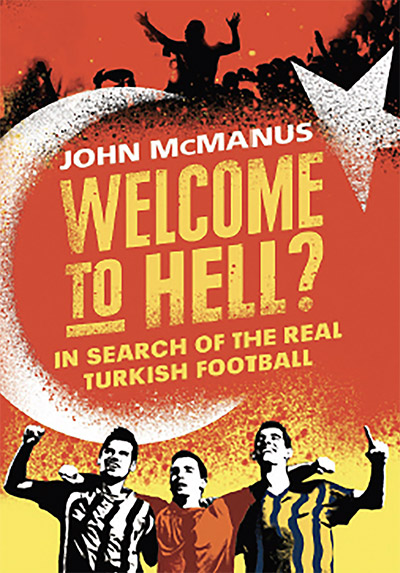
by John McManus
Orion Books, £20
Reviewed by Rob Kemp
From WSC 376, June 2018
Buy the book
Against the backdrop of an attempted coup, military crackdown and civil unrest John McManus, a Leicester-born Ankara-based anthropologist, goes on a journey to the heart of Turkish football. From dusty pitches on the Syrian border to the prosperous new stadiums of the Bosphorus he details how the game, just like the country, ploughs on in transition while teetering on the brink of crisis.
In tandem with the national team’s rise over the past 20 years, Turkey’s Super Lig has transformed itself from the supposed “Hell” that infamously greeted English supporters attending matches in the 1990s. Today it is home to compulsory ID cards and VIP seating, and is UEFA’s leading builder of new stadiums – 18 have gone up over a seven-year period and there are more to come.
Now, as Istanbul matchdays become increasingly sterile and addled with allegations of match-fixing, McManus heads off in search of colour and character across the country. He serves up both in ample measure. Nationalist agitators, left-wing ultras, Kurdish fanatics and Syrian ex-professionals – whose sports cars and five-star lifestyles have been replaced by tents and eking out an existence in refugee camps – all provide fascinating insight into the complex relationship between politics and football at all levels of the Turkish game. It’s an eye-opening tour, from a trip to Osmanlispor, the team owned by security firm where employees’ failure to attend matches is a sacking offence, to the origins of the “Big Three”, including the revelation that Istanbul’s elite sides owe much to Benedict Cumberbatch’s ancestors.
McManus gains access to the country’s most successful manager, Fatih Terim, and examines the similarities between Samantha (Terim’s unlikely Bewitched-inspired nickname) and the dictatorial President Erdogan, while also revealing how the former loves resolving issues with his fists. Indeed conflict is a common thread throughout as McManus’s journey culminates around the gruesome events of the July 2016 uprising. Here he focuses on his own sense of fear as a foreigner and the repercussions for football in general and Galatasaray especially, who were linked to the revolutionary Gulen movement.
The author does manage to celebrate and surprise too. The impact of the Turkish diaspora – such as Ilkay Gundogan, Emre Can and Mesut Özil – on the national side, coupled with the mixed experiences of foreigners such as Gordon Milne, Graham Souness and Darius Vassell makes for interesting reading. So too do his interviews on the women’s game, homophobia and Turkey’s strange experiment with female-only crowds at top-flight games. (For three years clubs punished for fan violence played in front of just women and children. This was abandoned when the women’s swearing became too bad.) From the national fixation with wider acceptance in Europe, in both economic and Champions League terms, to the amateur team made up of British descendants and Jewish settlers, McManus has done a fine job in showing how football at least offers salvation, structure and camaraderie to many in turmoil-ridden Turkey.